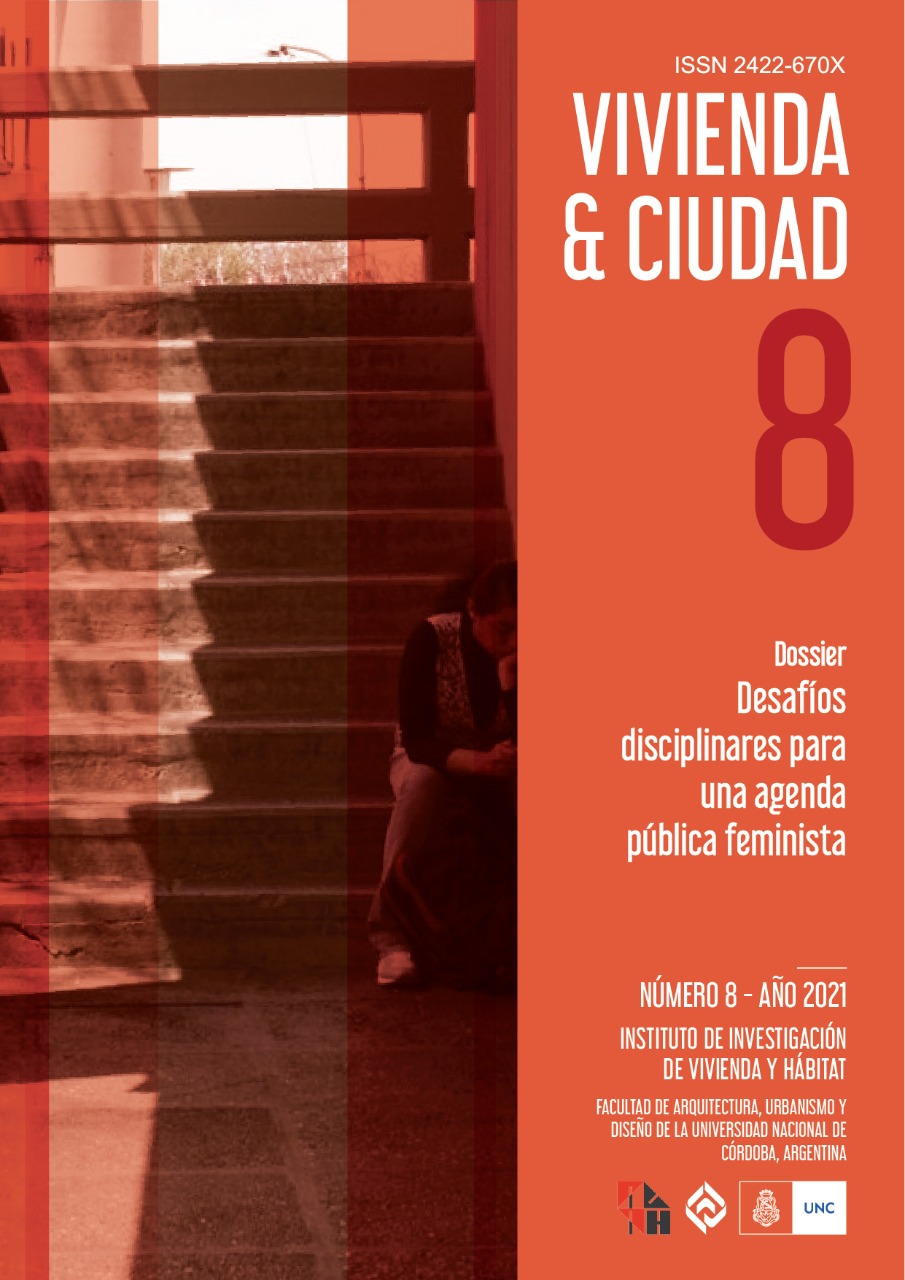Caring cities.
The participation of women and the construction of an counter-hegemonic urbanism.
Keywords:
caring cities, women participation, counter-hegemonic urbanismAbstract
The vast majority of contemporary cities are not prepared to satisfy the care of daily life, negatively impacting the quality of life of people and, in particular, those who carry out these activities, who are mostly women. (Valdivia, 2018) This work aims to problematize the current hegemonic urbanism, focusing on the Brazilian context and to show the way done for the construction of 'caring cities', from the participation of women involved in community life, political representatives, technical, academic and feminist activists, where care for daily life is valued, placed at the center of urban decisions and shared by society as a whole. These paths are presented in contrast to 'androcentric urbanism', which is structured on productive and industrial work and presents itself as neutral and universal, but which is directly directed to satisfy the demands of patriarchy. To this end, referential experiences will be presented to demonstrate the good practices for the construction of a counter-hegemonic urbanism, inserted in three different realities: in Barcelona and other cities in Catalonia, Spain; in Bogotá, capital of Colombia and in Porto Alegre, capital of Rio Grande do Sul, Brazil.
References
Ascher, F. (2010). Os novos princípios do urbanismo. Romano Guerra Editora.
Caldwell, K. L. (2000). Fronteiras da diferença: raça e mulher no Brasil. Revista Estudos Feministas, 8(2), 1-18. https://doi.org/10.1590/%25x
Campos, P. S., Silveira, N. (2015). Orçamento Participativo de Porto Alegre 25 anos. Editora da Cidade. http://lproweb.procempa.com.br/pmpa/prefpoa/observatorio/usu_doc/livro_orcamento__participativo_de_porto_alegre_-_25_anos.pdf
Dalmazzo Peillard, M. (2017). ¿Quién cuida en la ciudad? Oportunidades y propuestas en Bogotá (Colombia). Naciones Unidas. Comisión Económica para América Latina y el Caribe (CEPAL). Serie Asuntos de Género N° 148. https://www.cepal.org/es/publicaciones/42428-quien-cuida-la-ciudad-oportunidades-propuestas-bogota-colombia
Gonzalez, L. (1988/2020). Por um feminismo afro-latino-americano. Em Por um feminismo afro-latino-americano: ensaios, intervenções e diálogos. F. Rios y M. Lima (Orgs.) (1ª edição, pp.139-150), Zahar.
Hollanda, H.B.de e Pellegrino, A. (2018). Política Representativa. Em Explosão Feminista: arte, cultura, política e universidade. H.B.de Hollanda (Org.) (1ª edição, pp. 61-72). Companhia das Letras.
IBGE – Instituto Brasileiro de Geografia e Estatística (2018). Pesquisa Nacional por Amostra de Domicílios Contínua. Outras formas de Trabalho. Informativo. https://biblioteca.ibge.gov.br/visualizacao/livros/liv101650_informativo.pdf
Matos, G. de. (2020, 07 de março). As cidades são pensadas para as mulheres? Urbanistas sugerem soluções de inclusão / Entrevistada por Luiza Queiroz. Casa Vogue. https://casavogue.globo.com/Arquitetura/Cidade/noticia/2020/03/cidades-sao-pensadas-para-mulheres-urbanistas-sugerem-solucoes-de-inclusao.html
Matos, L. G. de. (2009). As mulheres na democracia participativa. Etnografia da participação feminina no Orçamento Participativo de Porto Alegre a partir das lideranças comunitárias. [Monografía de grado, Universidade Federal do Rio Grande do Sul]. Arquivo digital. http://hdl.handle.net/10183/62022
Muxí-Martínez, Z. (2020). Aplicación de la perspectiva de género al urbanismo y la arquitectura. Experiencias a escala regional y muemcipal en Cataluña. Ciudad Y Territorio Estudios Territoriales, 52(203), 57-70. https://doi.org/10.37230/CyTET.2020.203.05
Paula, T. de (2021). O que as mulheres têm a ver com o Plano Diretor? Portal Geledés. https://www.geledes.org.br/o-que-as-mulheres-tem-a-ver-com-o-plano-diretor/
Paula, T.de (2019). Diáspora Urbana: as cidades reescritas. Arquitetas Negras (1ª edição, 24-35). Fundo para a Equidade Racial.
Rolnik, R.(2012). Como fazer valer o direito das mulheres à moradia? (http://www.direitoamoradia.fau.usp.br/wp-content/uploads/2012/01/guia-mulheres-PT.pdf
Santos, B.A. (2020, 09 de setembro). A experiência cooperativista de habitação no Uruguai: um breve panorama histórico. ArchDaily. https://www.archdaily.com.br/br/947330/a-experiencia-cooperativista-de-habitacao-no-uruguai-um-breve-panorama-historico
Valdivia, B. (2018). Del urbanismo androcéntrico a la ciudad cuidadora. Hábitat Y Sociedad, (11). https://doi.org/10.12795/HabitatySociedad.2018.i11.05
Wikipédia
Androcentrismo. (2021, 9 de setembro). Em Wikipédia https://pt.wikipedia.org/w/index.php?title=Androcentrismo&oldid=62014994
Porto Alegre. Dados. (2021, 20 de novembro). Em Wikipédia
https://pt.wikipedia.org/w/index.php?title=Porto_Alegre&oldid=62455468
Youtube
Lacol arquitectura cooperativa (2020, 25 de maio). La Borda: Visita arquitetônica [Vídeo]. Youtube. https://www.youtube.com/watch?v=YQYTrgeT7jY
Sostre Cívic (2017, 30 de junho). Projecte Princesa 49 _Procés participatiu espais comunitaris [Vídeo]. Youtube. https://www.youtube.com/watch?v=V_BIj_Hohxw&t=2s&ab_channel=SostreC%C3%ADvic
Downloads
Published
Issue
Section
License
Copyright (c) 2021 Katia de Oliveira

This work is licensed under a Creative Commons Attribution-ShareAlike 4.0 International License.
Authors who publish in this journal agree to the following terms:
a. Authors retain copyright and guarantee to the journal the right to be the first publication of the work as well as licensed under a Creative Commons Attribution-ShareAlike 4 license.
b. Authors may separately establish additional agreements for non-exclusive distribution of the version of the work published in the journal (e.g., placing it in an institutional repository or publishing it in a book), with an acknowledgement of its initial publication in this journal.
c. Authors are permitted and encouraged to disseminate their work electronically (e.g., in institutional repositories or on their own website) before and during the submission process, as this may result in productive exchanges, as well as earlier and greater citation of published work (See The Effect of Open Access).
d. 4.0 International Creative Commons Attribution-ShareAlike 4.0 License.










